The training programmes and courses based on this curriculum are intended to create a cadre of HWC mitigation professionals, implementing a holistic approach for bringing in enhanced effectiveness and efficiency in HWC mitigation measures in India.
This curriculum is suitable for in-service as well as probationary forest officers of the Indian Forest Service and State Forest Services. The curriculum has been designed and updated, in alignment with the existing curriculum at the national and state-level training institutes in India.
This curriculum has been designed for a stand-alone intensive course to be delivered over five days. However, because of its modular structure and participatory training methods, it provides enough flexibility and can be customised for delivery over longer durations such as 15 days or one month as well as for shorter field expeditions.
Learning Outcomes for SFS Probationary Officers
At the end of the training, the participants will be able to:
Learning Outcomes for IFS Probationary Officers
By the end of the course, the participants are able to:
Learning Outcomes for In-Service IFS Officers
By the end of the course, the participants will be able to:
Learning Outcomes for Decision-Makers
By the end of the course, the participants will be able to:

Content Module HWC-01: An Introduction to Human-Wildlife Conflict Mitigation: Taking a Holistic and Harmonious Coexistence Approach
This module facilitates comprehension of the basic concepts of biodiversity, wildlife and ecosystem services leading to a profound understanding of the fundamentals of human-wildlife conflict (HWC), its drivers and pressures, current state and trends, impacts and current response measures. At the same time, participants will be encouraged to think and discuss a holistic approach to HWC mitigation, i.e., the drivers, prevention and reduction of impacts, traditional and indigenous measures, and the relevant sectors and key stakeholders in India. The first section facilitates the participants in getting a deeper and more comprehensive understanding of the harmonious co-existence approach, holistic approach to mitigating human–wildlife conflict and One Health. Section two of the module provides an HWC profile of selected wildlife species-in-conflict, intended to prevent accidental encounters and to design effective and wildlife-friendly mitigation measures that are aligned with animal behaviour and ecology.
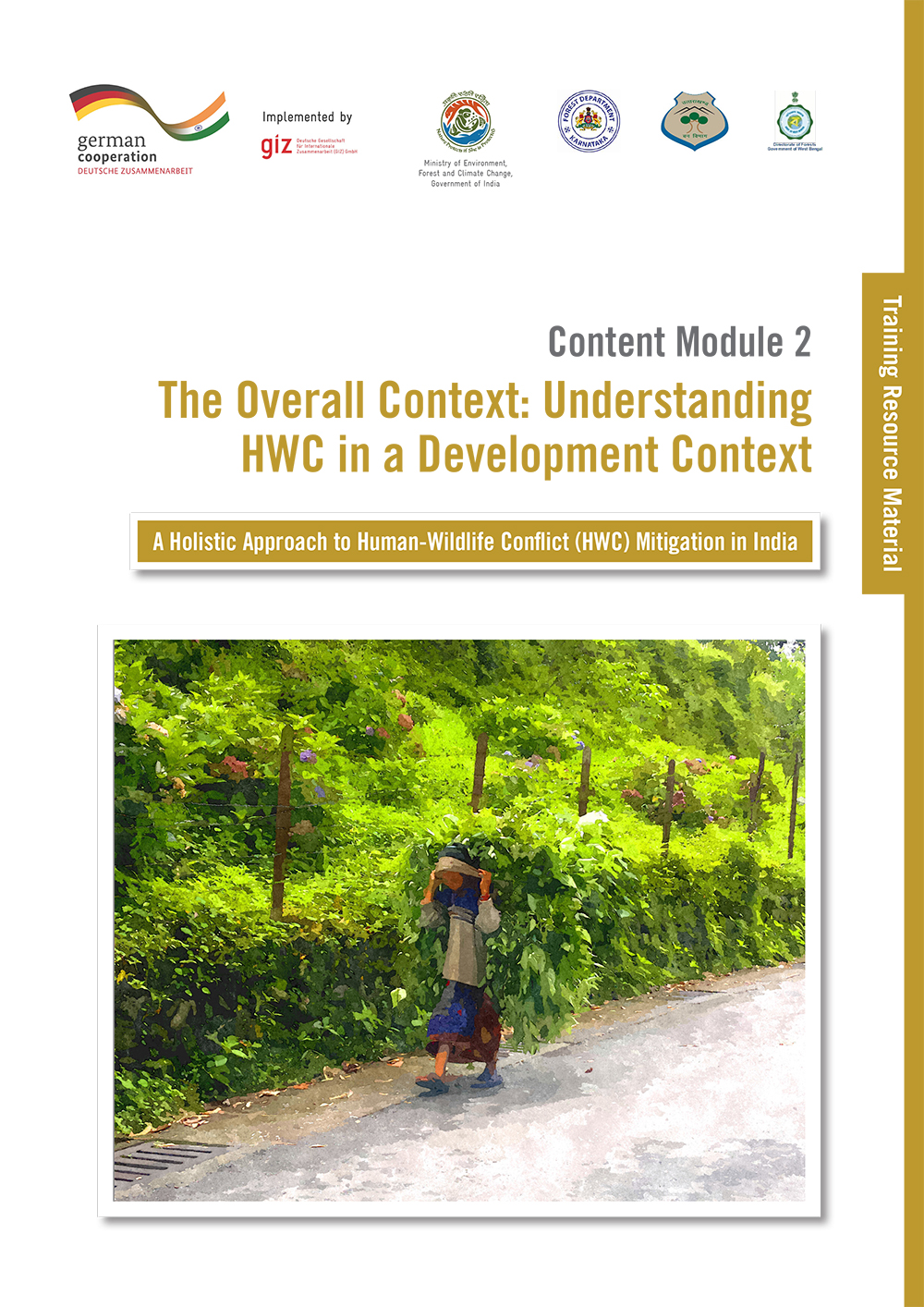
Content Module HWC-02: The Overall Context: Understanding HWC in a Development Context
This module facilitates the participants in developing an understanding of human-wildlife conflict and its mitigation in the overall development context. The concepts and issues related to the holistic approach to HWC mitigation are presented using the DPSIR approach, i.e., drivers, pressures, state, impact and response. With this module, the participants explore the relevance of corridors and landscape connectivity as one of the HWC mitigation measures while appraising the impact of land-use change on HWC. The module facilitates discussions on the relevance and significance of cross-sector cooperation in addressing the issue of HWC. The training sessions will sensitise and equip the participants in designing holistic HWC mitigation measures, which also address the needs and requirements of the most vulnerable and socially disadvantaged groups.

Content Module HWC-03: Legal, Policy, and Administrative Framework for HWC Mitigation in India
This module facilitates a discussion on the conservation ethos of India in relation to its legal framework. It presents an outline and brief history of international conventions and treaties relevant to the conservation of wildlife and, in particular, to HWC mitigation. The primary aim of this module is to serve as a compendium of key regulations, policies, customary rules, guidelines and SOPs related to HWC mitigation in India. The module also provides an analysis of some relevant HWC cases and specific learning points from these cases. The module thus provides information and guiding questions to facilitate a discussion on the application of current legal provisions to the mitigation of HWC in India.
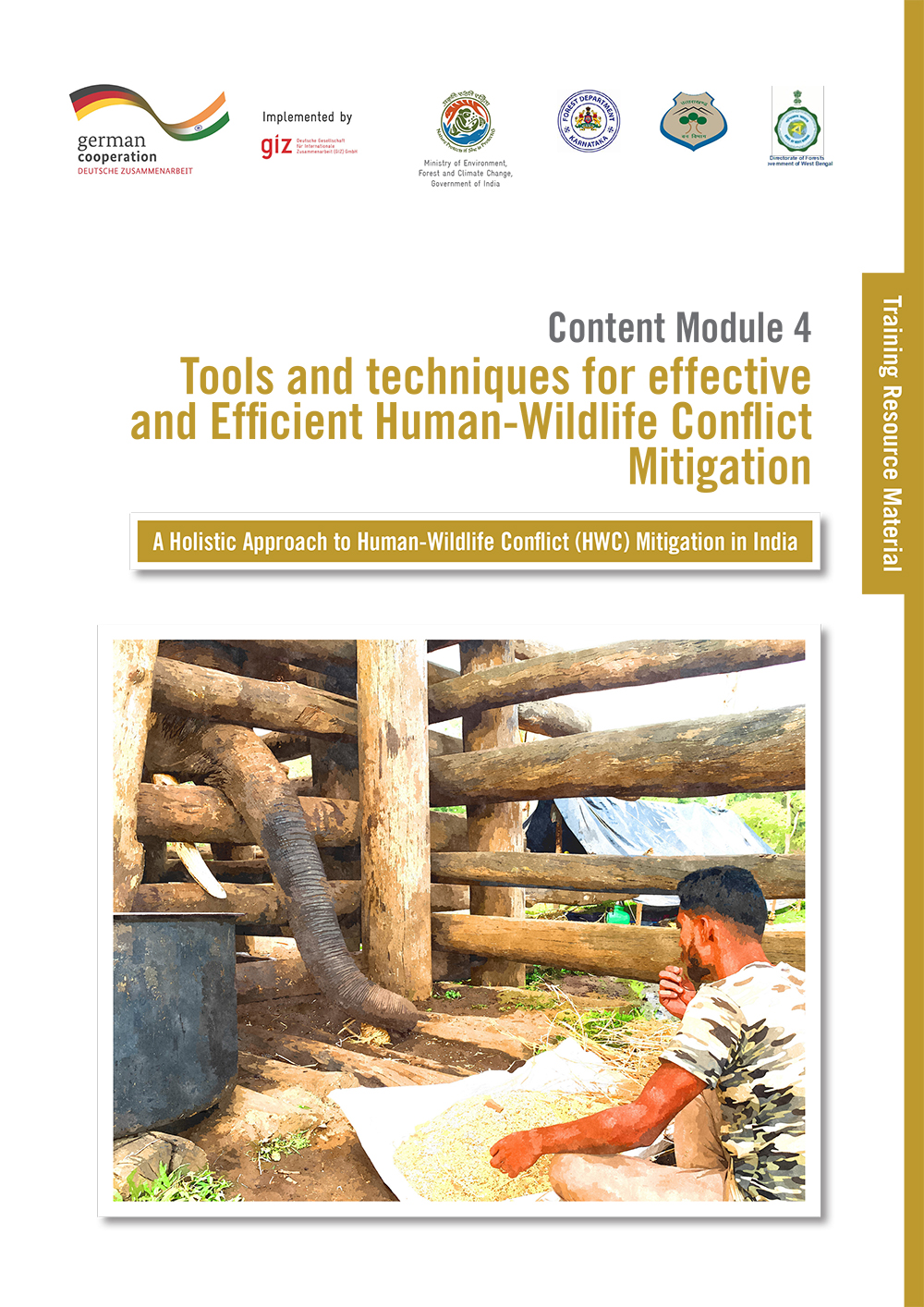
Content Module HWC-04: Tools and Techniques for Effective and Efficient Human-Wildlife Conflict Mitigation
Mitigation and management of human-wildlife conflicts need to be addressed from multiple scales. While policies and protocols are essential at a regional scale, effective and timely monitoring, response and evaluation are essential at the local scale. This module focuses on the tools and techniques required at the fieldlevel to implement the HWC mitigation measures addressing the drivers, monitoring and patrolling and other prevention measures addressing emergency response. The module provides an overview of methods and tools used in wildlife monitoring, tracking, mapping, rescue & rehabilitation. The first section focuses on the selected tools that may be useful for HWC mitigation, and the second section focuses on selected techniques and skills that may come in handy for the field-response teams during HWC mitigation measures.
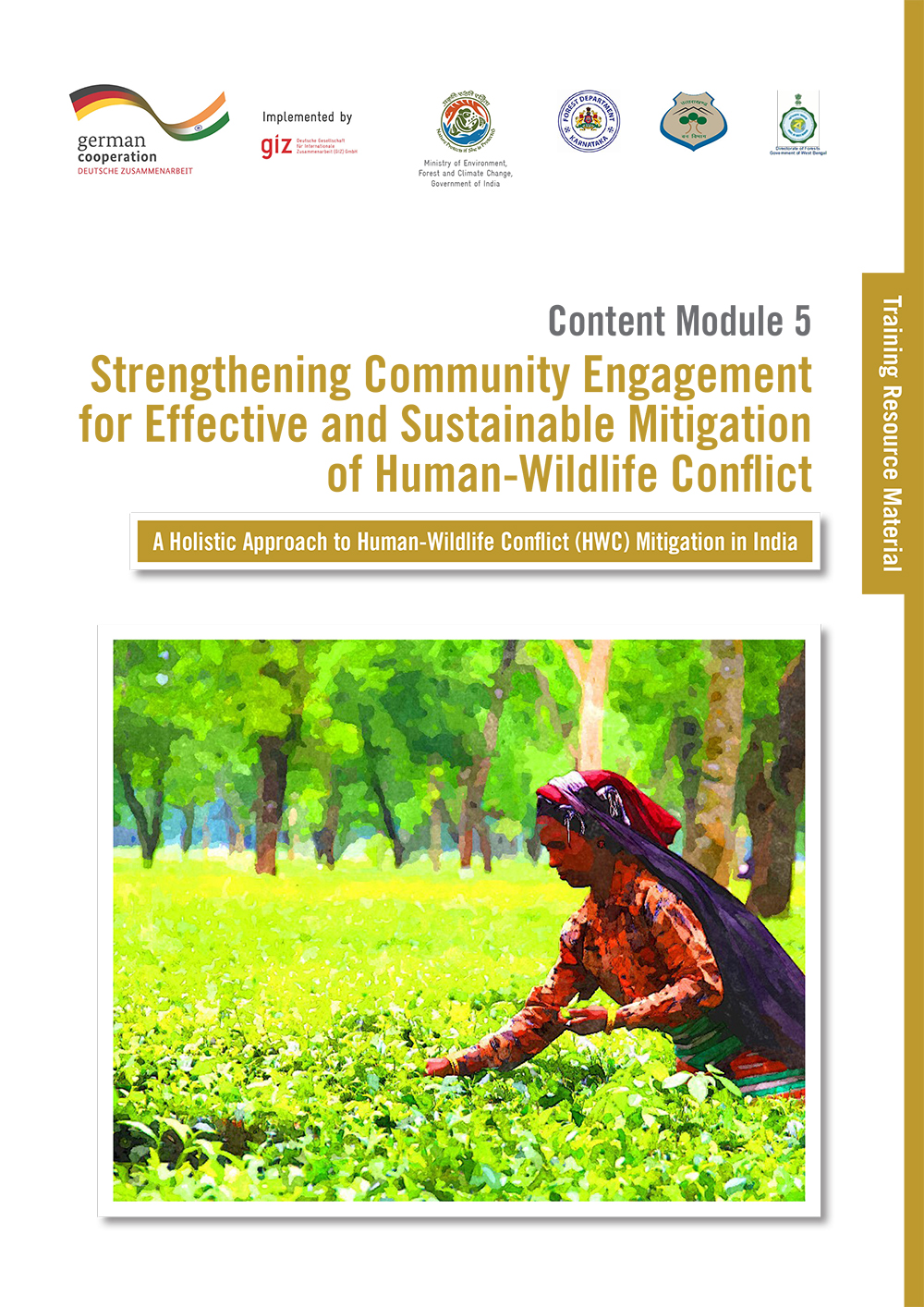
Content Module HWC-05: Strengthening Community Engagement for Effective and Sustainable Mitigation of Human-Wildlife Conflict
The module elaborates on the interlinkages among biodiversity and wildlife conservation; livelihood needs taking a holistic approach to HWC mitigation. It appraises the participants of HWC issues from socio-economic, psychological, ecological and cultural angles. It introduces the concept of stakeholder analysis vis-à-vis HWC conflict mitigation and equips participants with the tools, methods and knowledge necessary to conduct stakeholder analysis at a micro level and eventually link it with the larger district-, state- and national-level planning and management activities for HWC. It highlights the significance of engaging with all key stakeholders and vulnerable sections of society (women and marginalised communities) and facilitates the participants to delineate the roles of various stakeholder groups, especially village-level institutions, their capacity development needs and stakeholder-specific engagement methods.
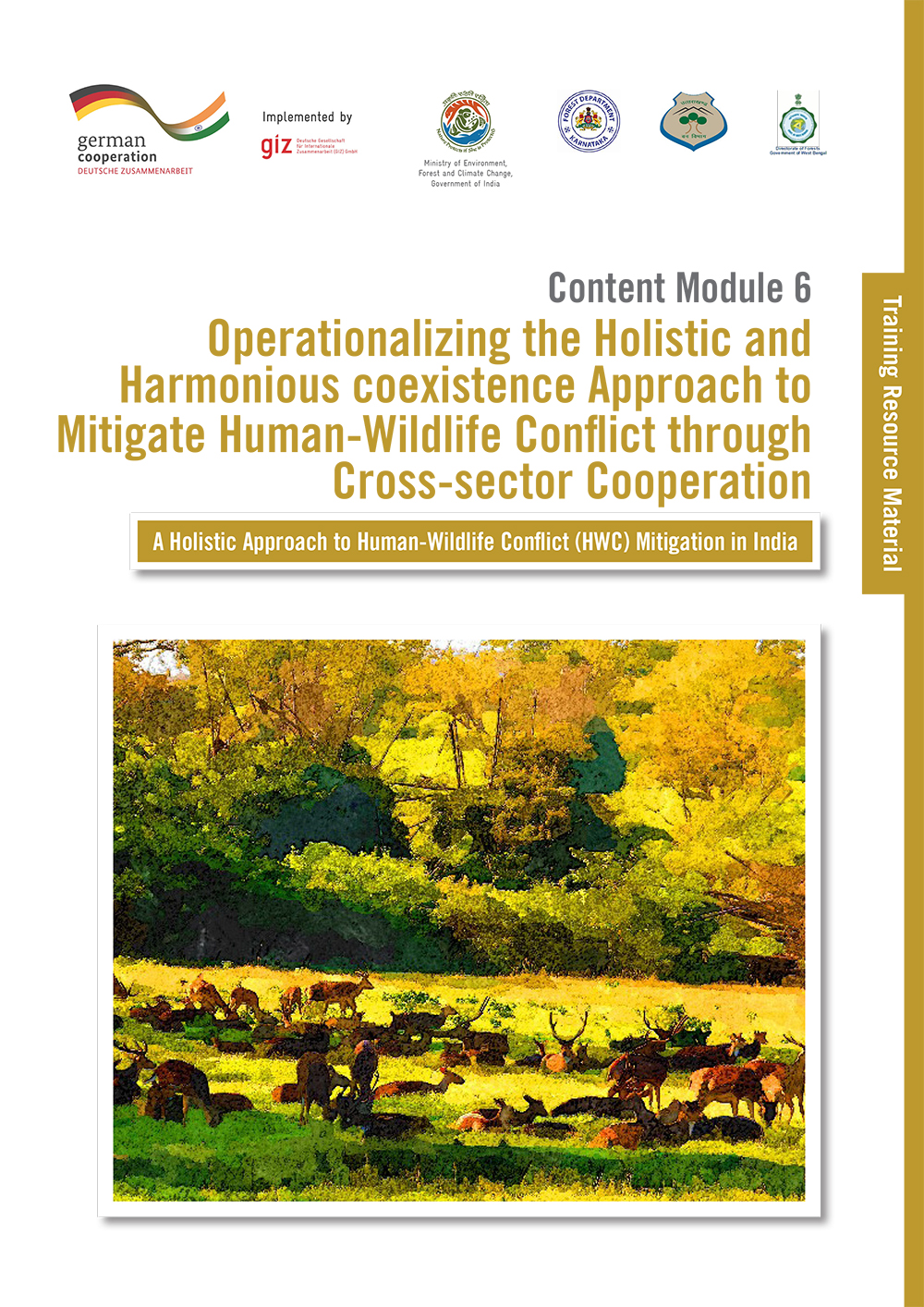
Content Module HWC-06: Operationalizing the Holistic and Harmonious Coexistence Approach to Mitigate Human-Wildlife Conflict through Cross-sector Cooperation
This module provides the conceptual background and introduction to the ‘why’ and ‘how’ of facilitating cross-sector cooperation and inter-agency coordination for effective HWC Mitigation. The module lays down a conceptual framework, using a systems thinking approach, to facilitate the participants in establishing the need for such cooperation and identifying key sectors and anchoring points for the required cross-sector and inter-agency coordination. The module facilitates the participants in discussing the institutional framework that enables effective and efficient cross-sector cooperation and possible areas of alignment with key sectors and stakeholders. The module takes the participants through examples of the National HWC Mitigation Strategy and Action Plan of India and 14 guidelines on HWC as key instruments to facilitate cross-sector and inter-agency coordination.
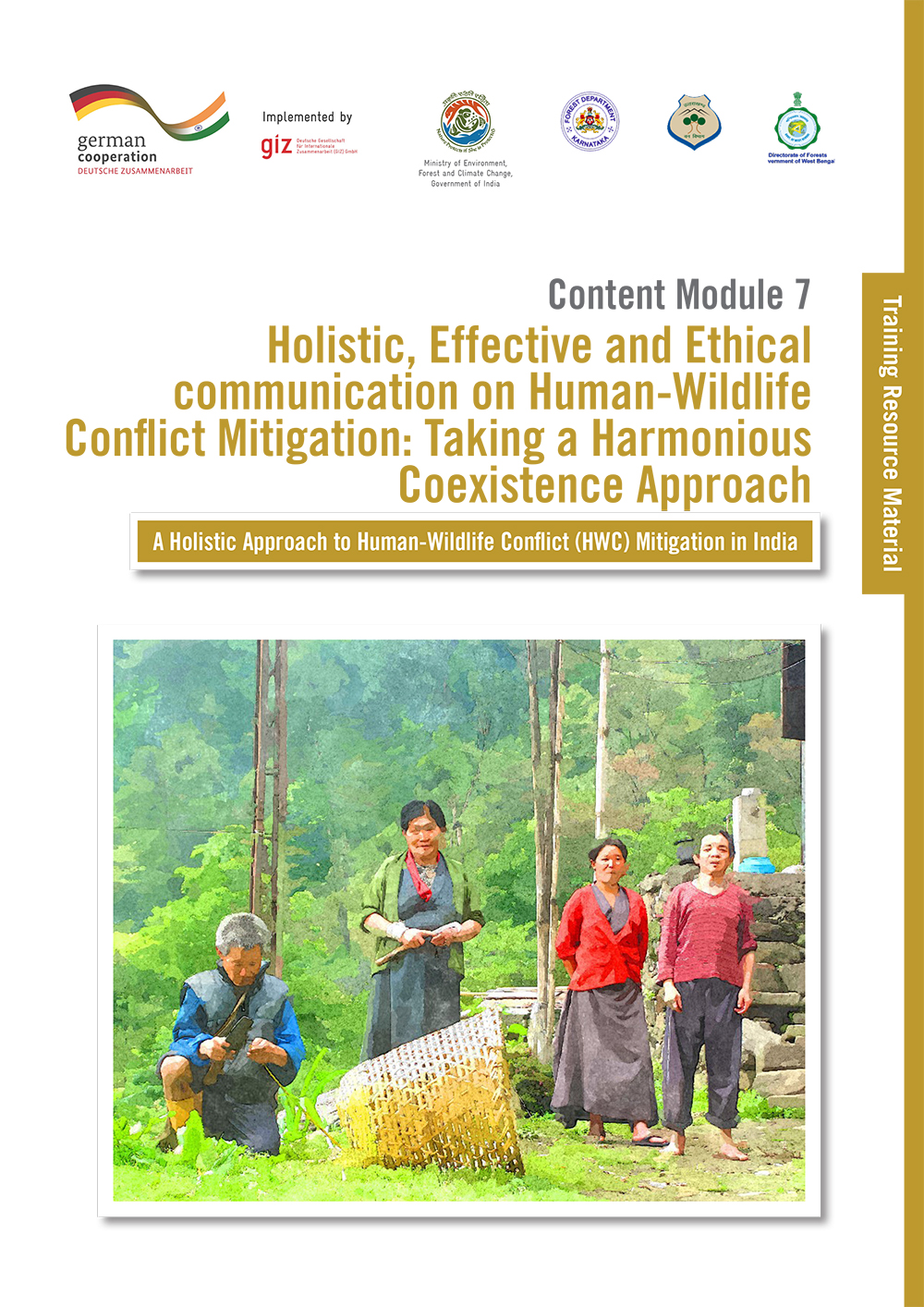
Content Module HWC-07: Holistic, Effective and Ethical Communication on Human-Wildlife Conflict Mitigation: Taking a Harmonious Coexistence Approach
This module sets the base by providing basic information on how media works, an indication of the challenges faced by the media and forest sector in cooperating with each other. The module further facilitates a constructive debate and discussion on holistic, effective and ethical communication on HWC mitigation among participants, in line with a harmonious coexistence approach. The module provides the required information and case examples for the participants, from the forest as well as from the media sector, to identify the right media for the right message and the right audience, questioning and breaking the stereotypes and clichés and pitching HWC mitigation stories effectively. The central focus of the module is the ethical reporting and writing of the media regarding HWC and tools that aid ethical reporting and crisis communication.
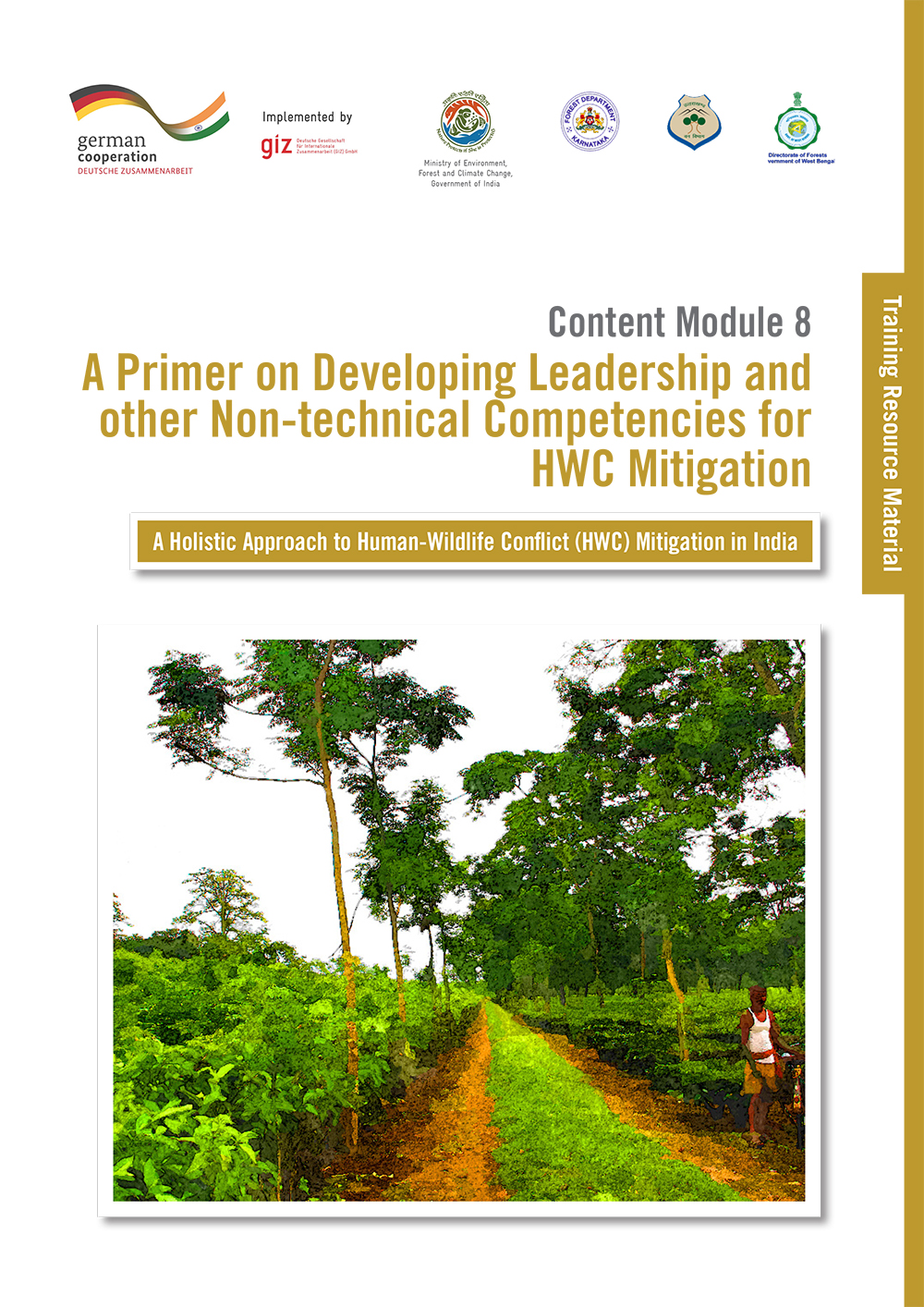
Content Module HWC-08: A Primer on Developing Leadership and Other Non-technical Competencies for HWC Mitigation
This module facilitates the participants in further strengthening their personal competencies required for facilitating stakeholder engagement, such as communication, leadership, consensus building, community engagement, empathy and self-awareness. The module facilitates hands-on sessions to facilitate the development of competencies related to workplace effectiveness, such as commitment and integrity, decision-making, result orientation, accountability, planning and coordination, resource management and crisis management. The module also facilitates the participants to foresee and be ready for future challenges through working on competencies such as pattern recognition, innovation and learning, change management and critical thinking.
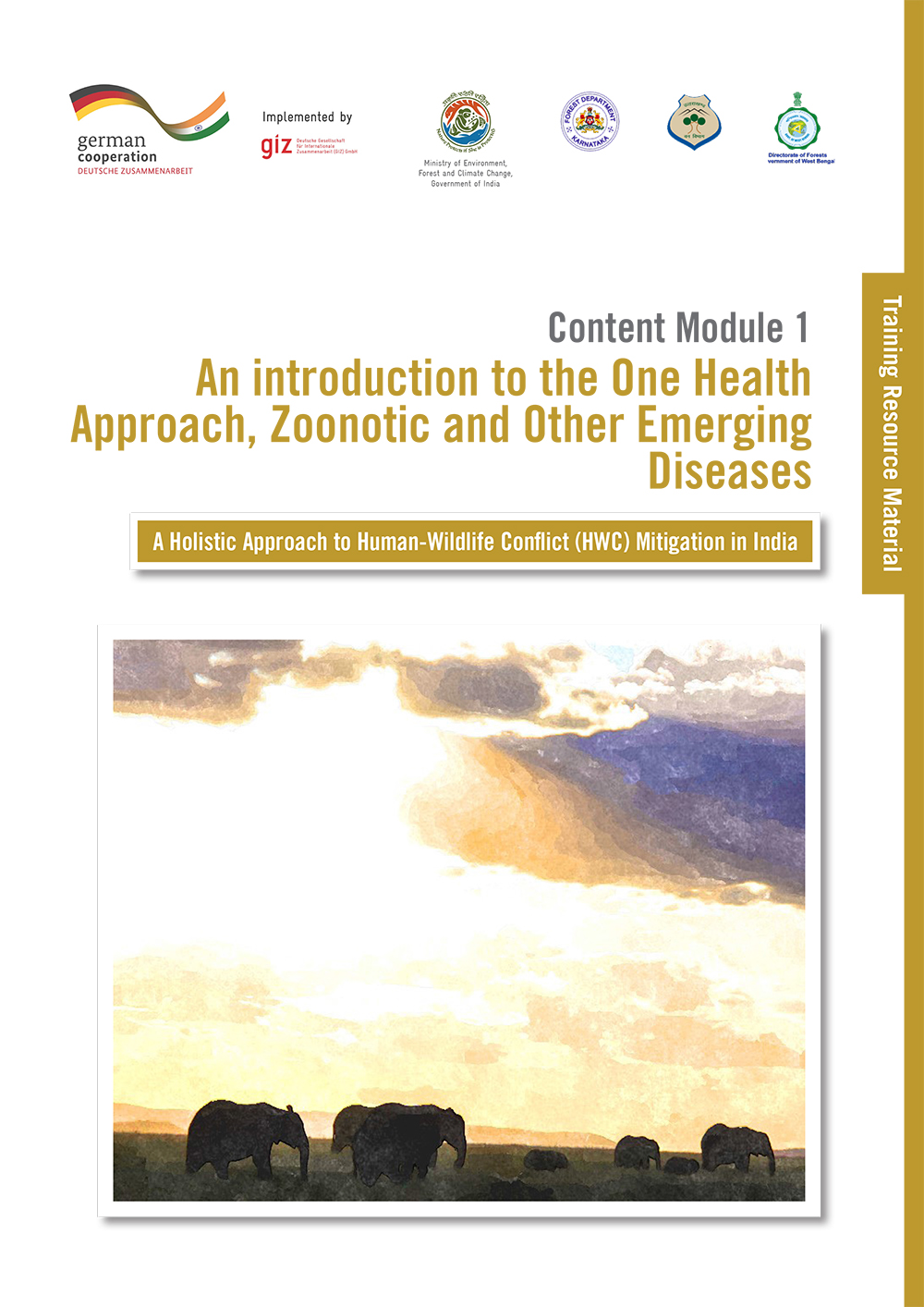
Content Module OH-01: An Introduction to the One Health Approach, Zoonotic and Other Emerging Diseases
This module brings conceptual, analytical and contextual clarity among participants on the One Health concept and approach in the overall development context. It highlights the relevance of the One Health approach in managing the protected areas and wildlife and mitigating the human-wildlife conflict. Additionally, the module provides a thorough explanation of some critical zoonotic and other emerging diseases, including their key drivers such as ecological changes, habitat loss, wildlife trade, the increased interface between human-animal, bushmeat hunting and consumption, animal husbandry practices, impacts and prevention measures. Participants will be introduced to basic concepts of cross-sector cooperation, international and national frameworks, policy and programmes on One Health.
© 2014 IGBP. All Rights Reserved.
Site By: Virtualpages
